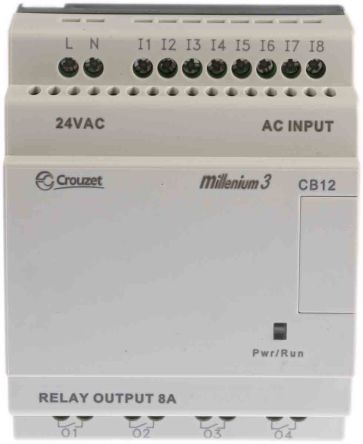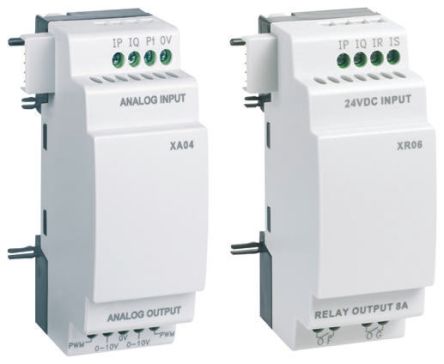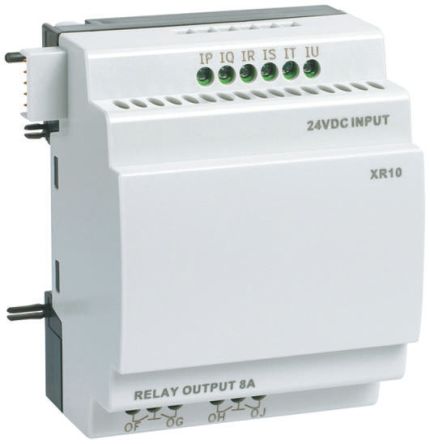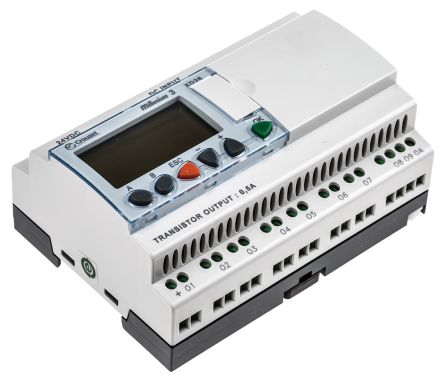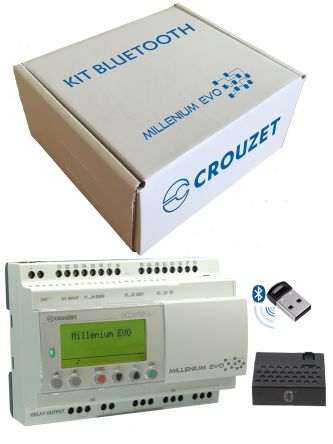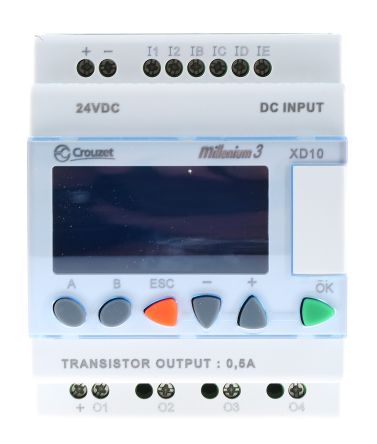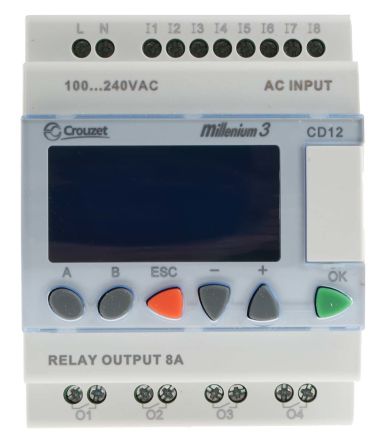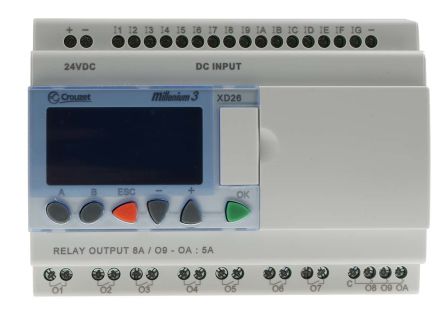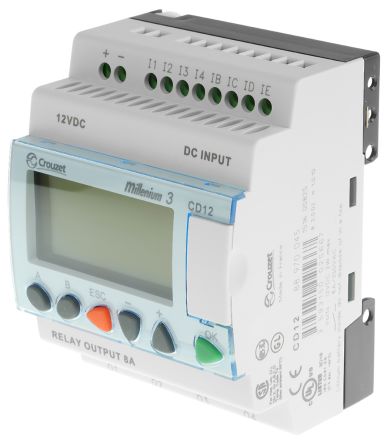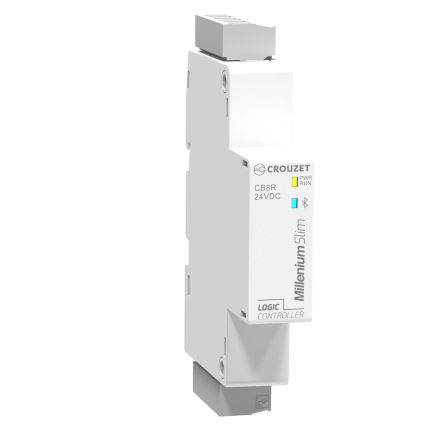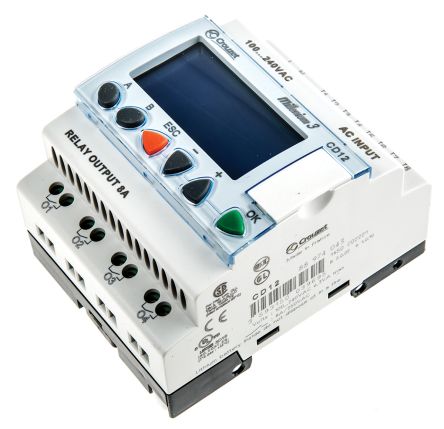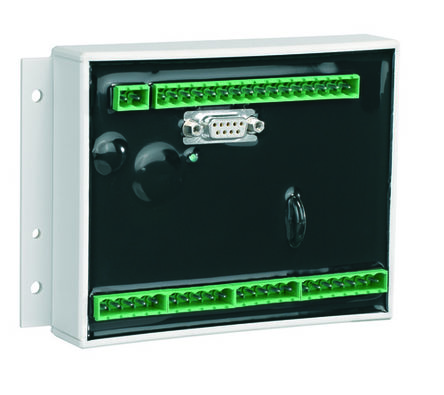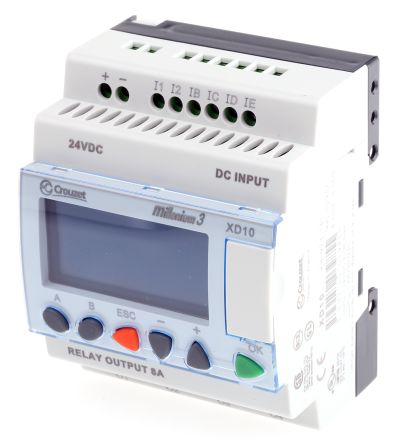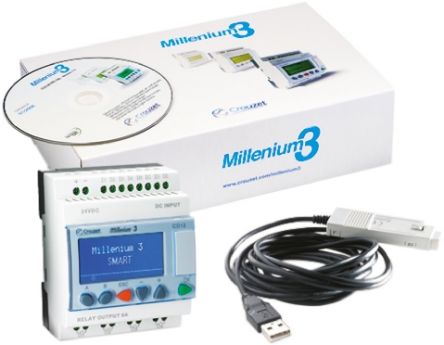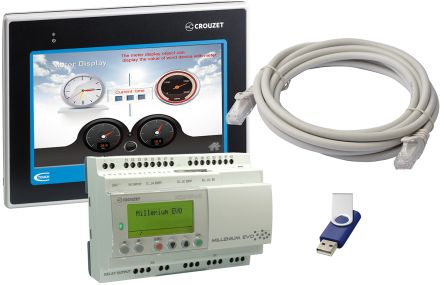- Automation & Control Gear
- Cables & Wires
- Enclosures & Server Racks
- Fuses & Circuit Breakers
- HVAC, Fans & Thermal Management
- Lighting
- Relays & Signal Conditioning
- Switches
- Batteries & Chargers
- Connectors
- Displays & Optoelectronics
- ESD Control, Cleanroom & PCB Prototyping
- Passive Components
- Power Supplies & Transformers
- Raspberry Pi, Arduino, ROCK, STEM Education & Development Tools
- Semiconductors
Crouzet PLCs - Programmable Logic Controllers
PLC stands for Programmable Logic Controller. It is a digital computer-based control system commonly used in industrial automation to monitor and control machinery or processes. A PLC is designed to withstand harsh industrial environments and is typically used to automate tasks that require precision, reliability, and flexibility. It consists of a programmable microprocessor, input and output modules, and various communication interfaces. PLCs can also be adapted to monitor and control sensors and actuators, processing electrical signals and using them to execute pre-programmed commands for different applications. They can even be networked to control an entire production line.
How do PLCs (Programmable Logic Controllers) work?
PLCs work by executing a program or set of instructions to control and automate industrial processes. Here's a breakdown of the steps involved:
- Input Acquisition: Programmable Logic Controllers begin their process by gathering data from connected input devices, such as photoelectric sensors, switches, or other measuring instruments. This data might relate to temperature, pressure, or other operational conditions critical for process control.
- Programme Execution: Once the input data is collected, the Programmable Logic Controller processes it according to pre-programmed logic. This set of instructions is developed by system engineers and tailored to meet specific operational requirements.
- Programme Logic: At the heart of a Programmable Logic Controller’s functionality is its programmed logic, which dictates the actions based on the input data. This logic includes timing, counting, sequencing, and arithmetic operations that guide the decision-making processes.
- Decision Making: Using the interpreted data and the programmed logic, the Programmable Logic Controller makes decisions to adjust or maintain the process being controlled. This step is crucial for ensuring operations remain within designated parameters.
- Output Control: Following the decision-making process, the Programmable Logic Controller sends commands to output devices like actuators, electric motors, and other machinery to execute actions that adjust the process. For example, it might increase the speed of a conveyor belt or open a valve.
- Communication: Programmable Logic Controllers often need to communicate with other systems, such as supervisory control and data acquisition (SCADA) systems or other PLCs. This communication is essential for integrated process control, where multiple subsystems operate collaboratively.
- Monitoring and Diagnostics: Programmable Logic Controller modules continuously monitor the process and diagnose issues in real time. This functionality allows for immediate troubleshooting and is essential for preventive maintenance, ensuring high reliability and minimising downtime.
What are the benefits of PLCs (Programmable Logic Controllers)?
PLCs offer numerous advantages that make them indispensable in modern industrial automation. These benefits include:
- Flexibility: Provide a high degree of flexibility in terms of programming and reprogramming. They allow for easy modification and adaptation of control logic to accommodate changes in the process or system requirements without requiring hardware modifications.
- Reliability: Designed for reliable operation in harsh industrial environments. They are built to withstand extreme temperatures, vibration, electrical noise, and other challenging conditions. PLCs are known for their robustness and durability.
- Real-time Operation: Offer real-time control, enabling precise and timely response to inputs and events. This is crucial in applications that require fast and accurate control, such as high-speed manufacturing processes or critical safety systems.
- Diagnostics and Troubleshooting: PLCs provide built-in diagnostics and monitoring capabilities, allowing operators to detect faults, analyse performance, and troubleshoot issues quickly. This facilitates maintenance and minimises downtime.
- Safety Features: Many PLCs offer safety-oriented functionality, including specialised programming languages and certified safety modules. Safety PLCs ensure compliance with industry safety standards and provide features such as safety interlocks, emergency stop functions, and fault detection.
- Remote Access and Monitoring: PLCs with network connectivity allow for remote access and monitoring, enabling operators to control and monitor processes from a central location or through secure remote connections. This enhances operational efficiency and facilitates remote troubleshooting.
Common Types of PLCs
There are primarily two main types of Programmable Logic Controllers: fixed and modular, each serving different needs with unique advantages.
- Fixed Programmable Logic Controllers: These PLCs possess a set number of inputs and outputs integrated within a single compact unit. These are more price-conscious and ideal for smaller systems where space and budget constraints exist. However, their internal wiring and limited memory make them less adaptable and more challenging to repair, which can lead to increased downtime.
- Modular Programmable Logic Controllers: These offer scalability and customisability, making them suitable for large-scale operations that demand complex control systems and the possibility of future expansions. Comprising separate modules that can be easily added or removed, they enhance flexibility and facilitate maintenance. Modular PLCs minimise downtime by allowing individual modules to be isolated and repaired independently, ensuring ongoing system operation.
What applications use PLCs (Programmable Logic Controllers)?
PLCs are versatile and integral in numerous sectors, such as:
- Manufacturing: In manufacturing, PLCs manage real-time decision-making processes, integrating with IoT and automation technologies to streamline operations and improve efficiency.
- Power Generation and Distribution: PLCs are critical in controlling and monitoring operations within power plants, managing everything from fuel handling to emissions control, enhancing both safety and efficiency.
- Chemical and Petrochemical Industry: In these industries, PLCs handle process variables like temperature and pressure, which is crucial for maintaining product quality and safety in highly reactive environments.
- Water and Wastewater Treatment: PLCs monitor and control the various stages of water processing, from chemical dosing to filtration, ensuring compliance with health and environmental standards.
- Food and Beverage Industry: PLCs are used to automate production lines, ensuring precise control over ingredient mixing, packaging, and storage conditions to maintain product consistency and safety.
- Automotive Industry: In automotive manufacturing, PLCs, including those specialised in air compressor PLC control, standardise production processes to increase efficiency and ROI. They adeptly manage assembly lines and robotic systems, ensuring seamless operation across various manufacturing stages.
- Pharmaceutical Industry: PLCs ensure precise management of formulations, environmental conditions, and production timelines, which is crucial for compliance with strict industry regulations.
- Packaging and Material Handling: PLCs automate and optimise packaging lines and material handling systems, improving speed and accuracy in logistics operations.
- Oil and Gas Industry: PLCs play a vital role in monitoring and controlling drilling operations, pipeline distribution, and safety systems to manage risks in volatile environments.
Your Trusted Supplier of Programmable Logic Controllers
RS is a globally recognised supplier and distributor of PLCs that cater to various industrial applications. We proudly offer Programmable Logic Controllers from top brands like Schneider Electric, Siemens, and Industrial Shields, alongside our own manufactured brand, RS PRO, at competitive prices.
For more details on ordering, delivery services and delivery fees, please refer to our Delivery Page.
